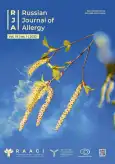Sublingual allergen-specific therapy in a child with diabetes mellitus
- Authors: Gaiduk I.M.1, Trusova O.V.2, Kamaev A.V.2, Arakelyan R.N.3
-
Affiliations:
- Saint-Petersburg State Pediatric Medical University
- Academician I.P. Pavlov First St. Petersburg State Medical University
- Consultative and diagnostic center №85
- Issue: Vol 19, No 1 (2022)
- Pages: 152-157
- Section: Case reports
- URL: https://journals.rcsi.science/raj/article/view/121735
- DOI: https://doi.org/10.36691/RJA1525
- ID: 121735
Cite item
Full Text
Abstract
The seasonality of exacerbations of pollinosis, a widespread pathology in the pediatric population, depends on the timing of flowering plants in the patient's region of residence. With age, the symptoms of pollen allergy become more pronounced, pollen bronchial asthma develops, the effectiveness of symptomatic therapy decreases, the spectrum of causally significant allergens expands, which requires personalized effective treatment methods.
Cases of allergen-specific immunotherapy in patients with type 1 diabetes mellitus are rare, therefore they deserve special attention. In addition to a thorough assessment of the safety of the therapy in relation to the course of diabetes, it is necessary to pay attention to the advantages of sublingual immunotherapy, in particular, a significant reduction in the need for pharmacotherapy of exacerbations. The ultimate goal of sublingual immunotherapy is a persistent drug-free remission of an allergic disease for several years after the end of the course of treatment.
A description of a clinical case of a pediatric patient (boy, age 12 at the start of observation) with pollen allergy (allergic rhino-conjunctivitis to grass pollen) in combination with diabetes mellitus type 1 is presented. Initiation criteria of allergen-specific immunotherapy (clear seasonal peak of exacerbations, high and concordant data of allergotesting in vivo and in vitro, progredient course of pollinosis clinical signs during years before allergen-specific immunotherapy was started) discussed in case of comorbid patient. Possible risks were analyzed and absence of diabetes mellitus as contraindication for immunotherapy stated. The patient underwent 2 pre-coseasonal courses of sublingual immunotherapy with grass pollen allergens in 2020 and 2021 with a pronounced positive effect. In the second year of treatment, remission of the disease was achieved: almost complete absence of hay fever symptoms in the flowering season of 2021, no progression of the disease, a significant decrease in the need for therapy to relieve symptoms. During the course of therapy, the patient did not show any deterioration in the course of diabetes mellitus, and number of days with extra dosage of insulin not caused by dietary provocation, decreased. The patient is being monitored, and the third course of sublingual immunotherapy with grass pollen allergens is started.
Thus, allergen-specific immunotherapy with a sublingual method of administration of the drug is safe and effective in the treatment of pollen allergy, is recommended for outpatient use in patients from the age of five, is indicated especially for patients with a progressive nature of the disease when it is impossible to protect it from contact with an allergen or with insufficient effectiveness of standard pharmacotherapy.
Full Text
##article.viewOnOriginalSite##About the authors
Irina M. Gaiduk
Saint-Petersburg State Pediatric Medical University
Author for correspondence.
Email: sheveluk@inbox.ru
ORCID iD: 0000-0003-3633-4662
SPIN-code: 5207-5355
MD, PhD, Dr. Sci. (Med.), professor of department of Pediatrics named after academician A.F. Tur
Russian Federation, 2, Litovskay street, Saint-Peterburg, 194100Olga V. Trusova
Academician I.P. Pavlov First St. Petersburg State Medical University
Email: o-tru@mail.ru
ORCID iD: 0000-0002-0854-1536
SPIN-code: 3938-4377
MD, Cand. Sci. (Med.), associate professor, Department of Therapy with the course on Allergy and Immunology, PhD
Russian Federation, Saint PetersburgAndrey V. Kamaev
Academician I.P. Pavlov First St. Petersburg State Medical University
Email: andykkam@mail.ru
ORCID iD: 0000-0001-9654-3429
SPIN-code: 8554-8565
MD, Cand. Sci. (Med.), associate professor, Department of General Practice (Family Medicine), PhD
Russian Federation, Saint PetersburgRenata N. Arakelyan
Consultative and diagnostic center №85
Email: arakeljanrenata@rambler.ru
ORCID iD: 0000-0002-4544-9923
SPIN-code: 3898-6385
MD, allergist
Russian Federation, Saint PetersburgReferences
- Ziselson AD. Poliinosis in children. Leningrad: Meditsina; 1989. 160 p. (In Russ).
- Alvaro-Lozano M, Akdis CA, Akdis M, et al. EAACI Allergen Immunotherapy User’s Guide. Pediatr Allergy Immunol. 2020; 31(Suppl. 25):1–101. doi: 10.1111/pai.13189
- Pitsios C, Demoly P, Bilo MB, et al. Clinical contraindications to allergen immunotherapy: an EAACI position paper. Allergy. 2015; 70(8):897–909. doi: 10.1111/all.12638
- Kurbacheva OM, Pavlova KS, Galitskaya MA. Clinical contraindications to allergen immunotherapy. Russian Journal of Allergy. 2017;14(2):10–21. doi: 10.36691/RJA319
- Klamt S, Vogel M, Kapellen TM, et al. Association between IgE-mediated allergies and diabetes mellitus type 1 in children and adolescents. Pediatr Diabetes. 2015;16(7):493–503. doi: 10.1111/pedi.12298
Supplementary files







